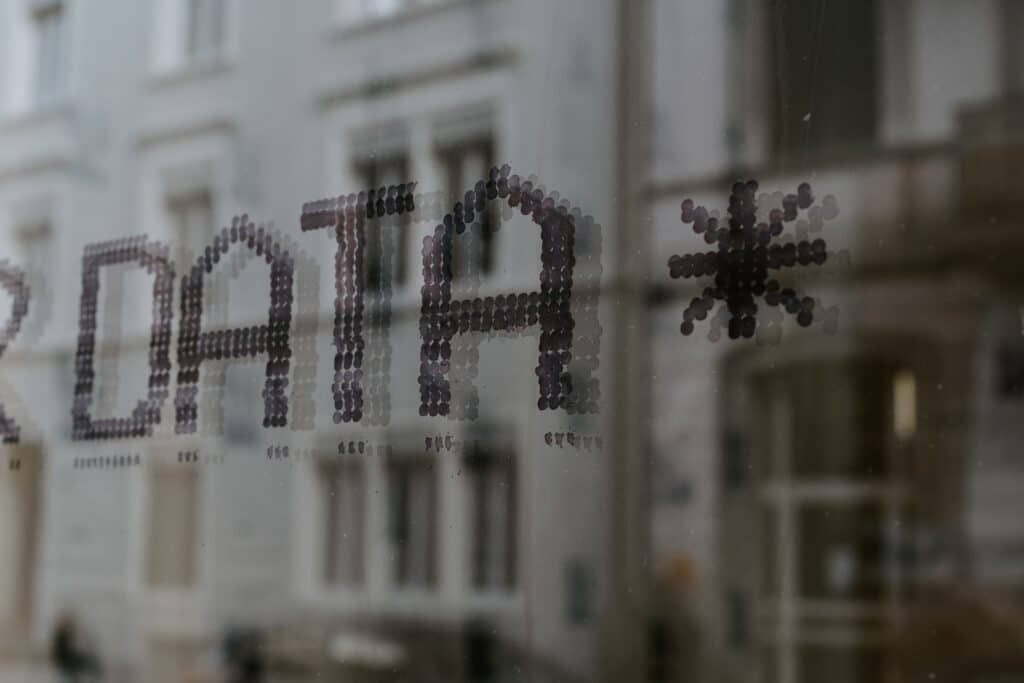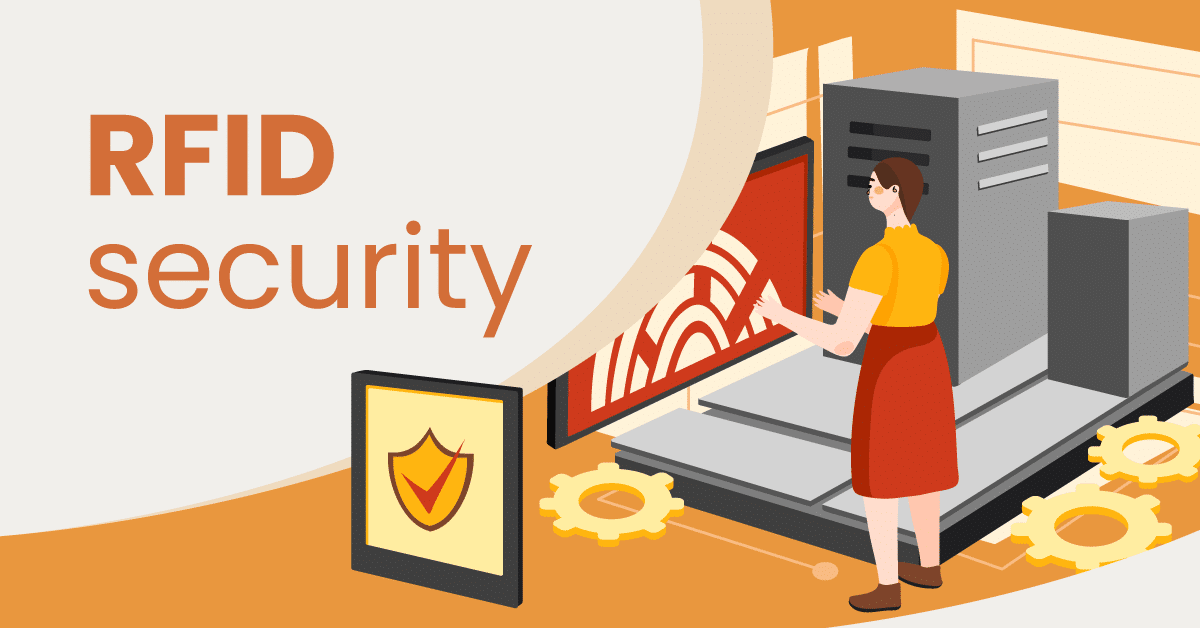Radio frequency identification (RFID) technology has revolutionized various industries, particularly in retail, by enhancing supply chain management, inventory tracking, and the overall customer experience.
RFID has shown measurable improvement in just about every aspect of running a retail business, from stock accuracy to labor productivity. However, with its widespread adoption, concerns about RFID security have emerged.
In this article, we will examine the types of security concerns that retailers must consider when implementing RFID.
We will also discuss how businesses can improve their RFID security to safeguard sensitive information. Learn how to take advantage of this emerging technology while keeping potential risks to a minimum.
? Key Takeaways:
- RFID technology improves inventory management, checkout speed, theft prevention, and supply chain visibility, making retail operations more efficient.
- There are various RFID tags, including passive, active, semi-passive, hard, paper, metal-mount, and tamper-proof tags, each serving different security and tracking purposes.
- RFID systems are vulnerable to unauthorized access, cloning, spoofing, eavesdropping, inventory manipulation, and denial-of-service attacks, which can compromise retail security.
- Retailers can mitigate RFID security risks by implementing encryption, access control, software updates, physical security measures, inventory audits, and employee training.
- While RFID enhances retail efficiency, businesses must invest in advanced RFID solutions and robust security measures to maintain consumer trust and data protection.
What Are RFID Security Tags?
RFID technology involves the use of RFID tags. These are small electronic devices equipped with a unique identification number. It also uses RFID readers that emit radio waves to communicate with the tags.
How Do RFID Security Tags Work?
In retail, RFID is utilized for inventory management, enhancing operational efficiency, and, ultimately, improving the customer experience. A more seamless checkout process directly impacts the customer experience.
Cashiers can scan items more quickly and accurately, preventing lines from backing up. RFID’s ability to manage inventory indirectly improves customer service.
RFID tags attached to merchandise store unique product information and enable retailers to track inventory levels in real time, reducing stockouts and increasing product availability.
Additionally, RFID enhances the customer shopping experience by enabling features like quick and secure self-checkouts and ensuring a seamless and efficient retail environment.
Finally, RFID tech allows staff members to complete certain tasks more efficiently, giving them more time on the retail floor to help shoppers.
KORONA POS offers comprehensive RFID integration.
Automate inventory management. Get a clear picture of all of your products.
Benefits of RFID Security Tags in Retail & Use Cases
1. Theft Prevention and Loss Reduction
RFID security tags detect unauthorized merchandise movement through exit points and identify the exact items being stolen. Unlike traditional barcode systems, RFID allows automated alerts when tagged merchandise leaves a designated area. Therefore, retailers can more effectively identify and address theft incidents.
2. Accurate Inventory Management
RFID readers can scan hundreds of items simultaneously from several feet away, eliminating human error in stock counts. They also speed up receiving and restocking processes, improving overall operational efficiency.
3. Improved Checkout Speed and Customer Experience
RFID tags allow for seamless, contactless scanning at checkout. Customers can place multiple items in an RFID-enabled checkout zone for instant billing, eliminating the need for individual barcode scanning. It enhances the shopping experience and streamlines the checkout process for both retailers and consumers.
4. Enhanced Supply Chain Visibility
RFID technology enables end-to-end supply chain tracking, providing retailers with real-time insights into product movement. It reduces bottlenecks, prevents misplacement, and ensures efficient inventory replenishment. Retailers can monitor shipments from suppliers to store shelves, optimizing logistics and reducing delays in product availability.
5. Better Customer Engagement and Personalization
With RFID-enabled smart fitting rooms and interactive kiosks, retailers can provide personalized recommendations based on customer selections. This technology enhances engagement by offering instant product details, availability status, and complementary item suggestions, creating a more immersive and tailored shopping experience.
6. Efficient Returns and Reverse Logistics
RFID tags streamline the returns process by instantly verifying product authenticity and purchase history. This reduces fraudulent returns and speeds up refund processing. Retailers can also track returned merchandise efficiently, enabling quicker reintegration into inventory or directing items to appropriate disposal or refurbishment channels.
Types of RFID Security Tags
1. Passive RFID Tags
Passive RFID tags have no internal power source and rely on the RFID reader’s energy to function. They are cost-effective, widely used in retail, and suitable for asset tracking. These tags come in various frequencies, including LF, HF, and UHF, with UHF being the most common for inventory management and anti-theft solutions.

Learn how to manage your inventory effectively with this free eGuide.
2. Active RFID Tags
Active RFID tags contain an internal battery that powers them, enabling longer read ranges and real-time tracking. They are ideal for high-value asset tracking, logistics, and supply chain management. They operate at higher frequencies, typically 433 MHz or 915 MHz, allowing continuous monitoring of assets over long distances.
3. Semi-Passive RFID Tags
Semi-passive RFID tags, also known as battery-assisted passive (BAP) tags, have an internal battery that powers the circuitry but relies on an RFID reader’s signal to transmit data. They offer better read range and performance than passive tags and are commonly used in environmental monitoring, medical asset tracking, and cold chain logistics.
4. Hard RFID Tags
Hard RFID tags are rugged and durable, designed for harsh environments such as manufacturing, logistics, and outdoor asset tracking. Made from materials like ABS plastic, metal, or ceramic, they withstand extreme temperatures, moisture, and chemicals. They are commonly used for vehicle tracking, industrial equipment monitoring, and warehouse automation.
5. Paper RFID Tags
Paper RFID tags are lightweight, flexible, and cost-effective, making them ideal for applications like ticketing, event management, and library book tracking. These tags use a thin substrate material embedded with an RFID chip and antenna. They are disposable and widely used in retail for anti-theft purposes and inventory control.
6. Metal-Mount RFID Tags
Metal-mount RFID tags are specifically designed to function on metallic surfaces, which typically interfere with RFID signals. These tags have a special insulating layer that prevents signal distortion. Common applications include IT asset tracking, automotive manufacturing, and industrial equipment monitoring, where metal surfaces are prevalent.
7. Tamper-Proof RFID Tags
Tamper-proof RFID tags are designed to break or deactivate when removed, making them ideal for security and authentication applications. They are commonly used in retail, pharmaceuticals, and access control systems to prevent unauthorized removal or counterfeiting. Some variants use self-destructing antennas or tamper-evident adhesives for added security.
RFID Security Risks
Because they store and transmit data, RFID systems are sometimes used by hackers and thieves to gain access to sensitive information. Recent research shows that eavesdropping, denial of service, and spoofing are the most common types of attacks.
Though there are several types of approaches used by individuals to steal data, below we’ll go over a few of the most commonly used methods:
Unauthorized Access
Hackers can intercept RFID signals, gaining unauthorized access to sensitive data, such as product information or customer details. This can lead to data breaches and compromise customer privacy.
Cloning and Spoofing
Criminals can clone or spoof RFID tags, creating counterfeit products or gaining access to restricted areas within the retail store. This attack can lead to revenue loss and damage the store’s reputation.
Inventory Manipulation
Attackers may manipulate RFID tags to change product information, such as pricing or expiration dates. Irregularities such as these can ultimately lead to dissatisfied customers.
Eavesdropping
RFID signals can be intercepted by eavesdroppers using specialized equipment. Attackers can gain insights into store activities, customer behaviors, and inventory levels. This information can be used for competitive advantage or malicious purposes.
Denial of Service Attacks
Attackers may flood the RFID system with a high volume of requests, overwhelming the network and causing a denial-of-service situation. This can disrupt store operations, leading to financial losses and customer inconvenience.

RFID Security in Access Control and Consumer Data Protection
Retailers can take several measures to protect their RFID implementation and mitigate potential security risks. Here are five examples of how retailers can safeguard their RFID systems:
Encryption and Authentication
Implement robust encryption algorithms to secure data transmitted between RFID tags and readers. Additionally, use authentication mechanisms to ensure only authorized devices and users can access the RFID system. This prevents unauthorized access and data interception. One easy and important step in this process is to enable two-factor authentication at your POS and on all work-related cloud-based accounts.
Access Control
Implement strict access control policies to limit access to RFID readers and related systems.
Use role-based access control mechanisms to restrict certain privileges based on necessity. Regularly review and update access permissions to ensure only authorized personnel can configure or interact with the RFID system.
Regular Software Updates
Keep RFID system software and firmware up-to-date. Manufacturers frequently release patches and updates to address security vulnerabilities. Retailers should establish a routine process for applying these updates promptly to protect against known exploits.
Physical Security Measures
Secure RFID readers and related infrastructure physically. Place fixed readers in secure locations and restrict physical access to authorized personnel only. Implement surveillance systems to monitor the areas where RFID technology is deployed, preventing unauthorized tampering or access.
Inventory Audits and Monitoring
Conduct regular inventory audits using RFID technology to detect discrepancies between RFID-tagged items and the inventory database. Implement real-time monitoring systems that identify unusual activities, such as unexpected RFID tag movements or unauthorized access attempts.
Monitoring helps retailers quickly detect and respond to security incidents and prevent retail fraud.
Employee Training
“Just like implementing any new technology, your system can only be as good as your employees. Our RFID server holds a lot of sensitive information. Training our staff to be aware of that and work to keep everything tightly controlled has certainly had a positive impact on our store security as a whole.”
Will B. – Federal Furniture
Provide comprehensive training to employees about RFID security best practices and the potential risks associated with RFID technology. Employees should be aware of phishing attempts, social engineering tactics, and other methods attackers might use to compromise the RFID system.
Well-informed employees are crucial in preventing security breaches. By implementing these measures, retailers can significantly enhance the security of their RFID technology and improve retail data security, ensuring the integrity and confidentiality of the data collected and processed within their systems.
Conclusion: Invest in Advanced RFID Solutions
RFID technology enhances efficiency and transparency within the retail sector and supply chains. However, the widespread adoption of RFID systems has brought forth security challenges, necessitating the implementation of robust security measures.
As RFID technology continues to evolve, staying ahead of potential security threats remains crucial to maintaining consumers’ trust and the integrity of retail operations. Working with a reputable and robust RFID technology solution will reduce your risks in the retail workplace.
KORONA POS partners with FID Enabled Solutions, a retail technology company with 20 years of experience. Together, we offer retailers optimized inventory control, visibility, and modern capabilities like self-checkout kiosks.
To learn more about KORONA POS and RFID, click the link below!











